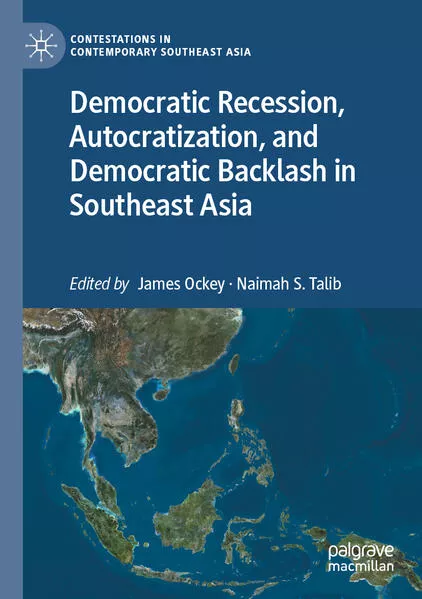
- Publikationen ca: 3
- Fragen & Antworten
James Ockey
Dr. James Ockey lectures in the Department of Political Science and International Relations, University of Canterbury, Christchurch, New Zealand. He has published widely on democratization and autocratization in Thailand. He is a co-founder and director of the Southeast Asia Research Initiative (SEARI) at the University of Canterbury.
Dr. Naimah S. Talib is an adjunct senior fellow in the Department of Political Science and International Relations, University of Canterbury. Her research focuses on democratization and the role of Islam in politics in Southeast Asia. She has done extensive research on the history and politics of Malaysia and Brunei.
Democratic Recession, Autocratization, and Democratic Backlash in Southeast Asia
This book presents a new organizing framework for studying democratic recession and autocratization in Southeast Asia. By introducing a new concept, “democratic backlash,” the book details how democratic recession inevitably provokes resistance that often forms the nucleus of new democratic movements, and in doing so, argues that it is important to identify these reverse trends that may eventually become dominant.
Democratic Recession, Autocratization, and Democratic Backlash in Southeast Asia
This book presents a new organizing framework for studying democratic recession and autocratization in Southeast Asia. By introducing a new concept, “democratic backlash,” the book details how democratic recession inevitably provokes resistance that often forms the nucleus of new democratic movements, and in doing so, argues that it is important to identify these reverse trends that may eventually become dominant.
Democratic Recession, Autocratization, and Democratic Backlash in Southeast Asia
This book presents a new organizing framework for studying democratic recession and autocratization in Southeast Asia. By introducing a new concept, “democratic backlash,” the book details how democratic recession inevitably provokes resistance that often forms the nucleus of new democratic movements, and in doing so, argues that it is important to identify these reverse trends that may eventually become dominant.


